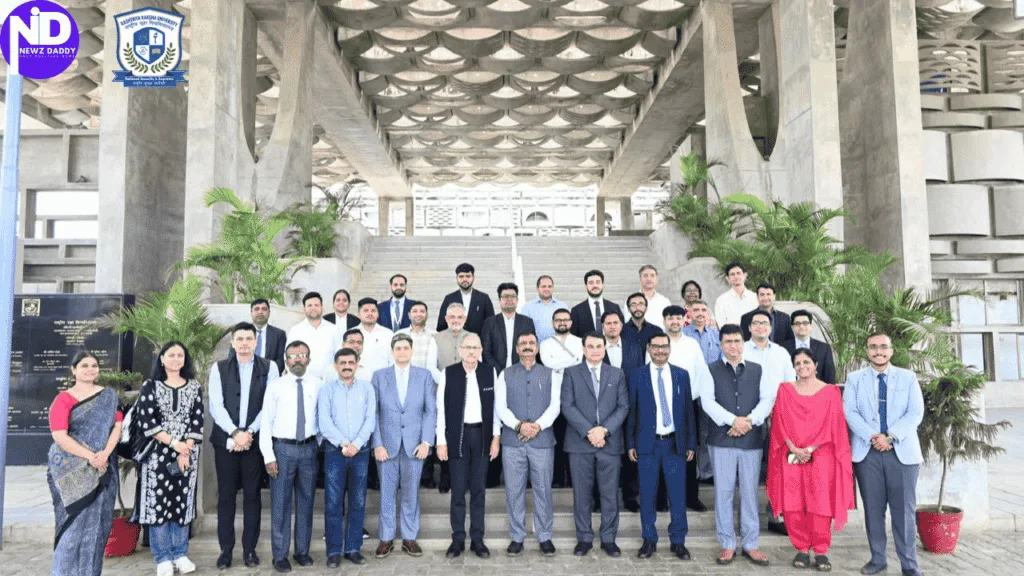Transforming India With Financial and Economic Crimes Experts
Newz Daddy Educational Updates
The Campus Immersion Week of the Master’s in Financial and Economic Crimes (MFEC) Programme commenced at Rashtriya Raksha University (RRU). The inauguration ceremony began with the felicitation of distinguished guests by Prof. (Dr.) Kalpesh H. Wandra, Pro Vice-Chancellor, RRU. The esteemed dignitaries included Mr Karnal Singh, Former Director, Enforcement Directorate and Director General, Indian Institute of Corporate Affairs (IICA), and Mr Gyaneshwar Kumar Singh.
The Enforcement Directorate (ED) is India’s agency to investigate money laundering and foreign exchange violations. It enforces the Prevention of Money Laundering Act (PMLA, 2002) and related acts. This makes the presence of ED’s former Director especially relevant. The Indian Institute of Corporate Affairs (IICA) works under the Ministry of Corporate Affairs to train officials, do policy research, etc. Their role ties into training people for handling corporate fraud, etc.
Delivering the inaugural address, Mr Karnal Singh congratulated the participants for being part of the first cohort of this pioneering programme, a course unparalleled anywhere in the country. He emphasised the national importance of this cohort in addressing emerging financial and economic crime challenges. Mr Singh highlighted evolving forms of fraud, such as GST frauds and insolvency-related frauds, and further elaborated on the misuse of investments in fraudulent activities, stating that “investments should never be against national security.”
GST (Goods and Services Tax) frauds have been in the news lately in India: fake invoicing, claiming input tax credit for invoices that don’t exist, etc. Insolvency-related fraud is also a big issue ,especially since the Insolvency and Bankruptcy Code (IBC) was strengthened. Frauds during insolvency can affect many stakeholders. The idea that investment misuse threatens national security connects to risks like money laundering and terrorist financing.
He also drew attention to the importance of non-financial reporting as a critical area of study for the participants. Towards the conclusion of his address, Mr Singh underscored how this programme can significantly contribute to the vision of Viksit Bharat @2047, with possible outcomes such as the development of a search engine for inter-bank transactions and the establishment of a Centre for Cyber Frauds.
Non-financial reporting includes disclosures by companies about their environmental, social, and governance (ESG) practices, risk management, fraud risk,etc. It is increasingly required in many jurisdictions. A search engine for inter-bank transactions would help trace suspicious flows between banks. A Centre for Cyber Frauds would address cybercrime like phishing, ransomware, hacking, which often link with financial crime.
Mr Gyaneshwar Kumar Singh, Director General, IICA, spoke about the relevance of the MFEC programme for anti-money laundering (AML) frameworks. He observed how the nature of economic crimes has transformed from relatively simple hawala transactions into multi-layered and structured frauds, which pose increasing challenges even for specialised agencies such as the Serious Fraud Investigation Office (SFIO). He elaborated on the implications of non-disclosure in cyberspace and the urgent need for advanced strategies to address cyber-enabled economic crimes. Further, he introduced the innovative concept of KYC, which is Know Your Company, emphasising its utility in the evolving corporate and regulatory landscape.
Hawala refers to informal value transfer systems, historically used to move money outside formal banking. Now, financial crime often uses shell companies, layered transactions, complex accounting, and offshore entities. SFIO investigates corporate fraud under the Companies Act ,etc. Know Your Company (KYC) is an expansion of Know Your Customer; it helps regulators understand ownership and control structures of companies to prevent fraud and money laundering.
In his concluding remarks, Prof. (Dr.) Kalpesh H. Wandra spoke about the vision of the Hon’ble Prime Minister for strengthening the pillars of economic integrity and financial resilience, and how Prof. (Dr.) Bimal N. Patel, Vice-Chancellor, RRU, is realising this vision through the MFEC programme. He also outlined the University’s ongoing and future initiatives in financial and economic crime prevention, including outreach to FATF, close engagement with the Ministry of Finance and many others. He extended his best wishes to all participants for a meaningful and fruitful Campus Immersion Week.
FATF (Financial Action Task Force) is the global watchdog which sets standards to combat money laundering, terrorist financing and other threats. India’s working with the FATF means aligning its laws, enforcement, and cooperation with international standards. The Ministry of Finance plays a big role in policy, funding, regulation, etc. RRU being involved in such programmes helps build skilled people for enforcement and compliance.
The Master’s in Financial and Economic Crimes (MFEC) is a one-year hybrid programme designed for professionals to build expertise in financial and economic crime prevention. As the first of its kind in India, it combines theoretical foundations with practical training to address emerging challenges in this domain. Launched by the Rashtriya Raksha University, in collaboration with the Ministry of Home Affairs and the Indian Institute of Corporate Affairs, the programme aims to strengthen the nation’s financial security and contribute to the vision of a Shashakt Bharat.
Hybrid programmes mean part online, part in-campus; this helps working professionals. Financial and economic crime prevention involves many fields: law, finance, forensics, cybersecurity, and corporate regulation. Rashtriya Raksha University (RRU) is an Institution of National Importance, set up to focus on security, forensic science, policing, cyber forensics, etc. This kind of programme supports national goals like strong institutions, rule of law,and integrity, which are part of “Shashakt Bharat”.

